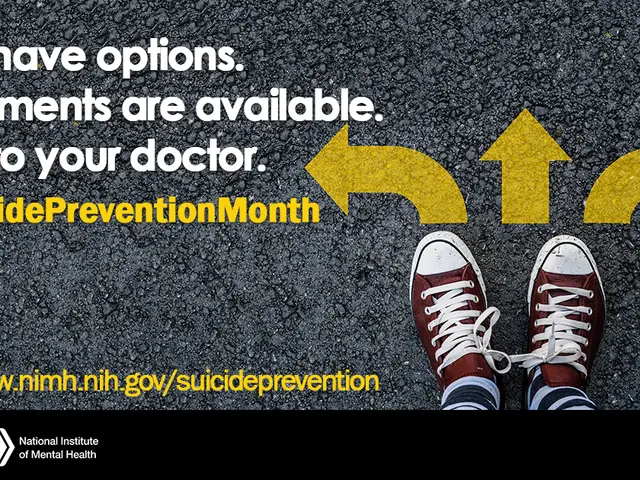Experiencing back pain and nausea? Exploring potential causes and remedies.
In our daily lives, nausea and back pain are common complaints that can be caused by a variety of factors. This article aims to shed light on the possible causes, treatments, and how pregnancy can impact these symptoms.
Nausea, often accompanied by a queasy feeling in the stomach, can stem from infections, digestive issues, medication side effects, and hormonal changes, particularly during pregnancy. Pregnancy-related nausea, often referred to as morning sickness, is primarily due to rapidly increasing pregnancy hormones during early pregnancy.
Back pain, on the other hand, may be caused by musculoskeletal issues, infections, inflammation, or serious conditions. Back pain accompanied by fever and nausea could indicate infections such as kidney or urinary tract infections, spine infections, or systemic illnesses like meningitis.
For those experiencing nausea, home remedies such as ginger (in candies or tea), peppermint (in tea or essential oils), and acupressure wristbands can provide relief. Over-the-counter options safe in pregnancy include vitamin B6 supplements and doxylamine (an antihistamine). It's advised to avoid carbonated beverages, which may worsen nausea.
Back pain treatment depends on the underlying cause. Antibiotics treat infections such as kidney infections, pain medications and rest help with musculoskeletal pain, and severe infections may require hospitalization and possibly surgery. Maintaining good posture, hydration, and managing chronic conditions can help prevent back pain.
Pregnancy significantly increases the likelihood of experiencing nausea, particularly in the first trimester due to hormonal changes. Back pain is also common during pregnancy, with physical changes such as weight gain, postural shifts, and ligament loosening contributing to or worsening back pain. Pregnancy-related sleep disturbances can further exacerbate pain and fatigue.
It's essential to seek medical advice when experiencing persistent nausea or intense stomach pain, especially during pregnancy. Conditions such as ulcers, kidney stones, diverticulitis, pancreatitis, multiple myeloma, gallbladder disease, liver disease, or metastatic cancers can cause nausea and back pain.
In conclusion, understanding the causes and treatments of nausea and back pain can help manage these symptoms effectively. Pregnancy is a known factor that increases the risk of both nausea and back pain due to hormone fluctuations and physical changes. Treatments during pregnancy focus on safe remedies and addressing underlying causes where necessary. If you're experiencing symptoms that concern you, always consult a healthcare professional.
- Nausea, a common symptom often accompanied by a queasy feeling in the stomach, can be caused by various factors such as digestive issues, medication side effects, hormonal changes, and infections.
- Pregnancy-induced hormonal changes significantly contribute to nausea, often referred to as morning sickness, especially during the first trimester.
- Back pain can be caused by a variety of factors including musculoskeletal issues, infections, inflammation, and serious conditions.
- Infections such as kidney or urinary tract infections, spine infections, or systemic illnesses like meningitis can cause back pain, accompanied by fever and nausea.
- Home remedies for nausea can include ginger (in candies or tea), peppermint (in tea or essential oils), and acupressure wristbands.
- Over-the-counter options safe during pregnancy for treating nausea include vitamin B6 supplements and doxylamine (an antihistamine).
- For back pain treatment, the underlying cause should be identified to determine the appropriate treatment, such as antibiotics, pain medications, and rest.
- Severe infections may require hospitalization and possibly surgery.
- Maintaining good posture, hydration, and managing chronic conditions can help prevent back pain.
- Pregnancy significantly increases the likelihood of experiencing nausea and back pain due to hormone fluctuations and physical changes.
- Physical changes during pregnancy such as weight gain, postural shifts, and ligament loosening can contribute to or worsen back pain.
- Pregnancy-related sleep disturbances can further exacerbate pain and fatigue.
- Persistent nausea or intense stomach pain, especially during pregnancy, should be evaluated by a healthcare professional.
- Conditions such as ulcers, kidney stones, diverticulitis, pancreatitis, multiple myeloma, gallbladder disease, liver disease, or metastatic cancers can cause nausea and back pain.
- Multiple sclerosis, a chronic autoimmune disorder that damages the myelin sheath around nerve cells, can also cause various symptoms such as depression, fatigue, and pains.
- Chronic obstructive pulmonary disease (COPD) is a chronic respiratory condition characterized by persistent blockage of airflow due to inflammation.
- Urinary incontinence and other urinary health issues can be addressed through various therapies and treatments.
- Depression, a common mental health illness, can be a side effect of various medical conditions, including chronic diseases and autoimmune disorders.
- Science and medical advancements have resulted in numerous therapies and treatments for numerous health and wellness issues, including chronic diseases, cancers, digestive health, eye health, hearing conditions, and neurological disorders.
- Maintaining a balanced diet, regular exercise, and proper skin care are essential for overall health and wellness, including men's health, women's health, fitness and exercise, and cardiovascular health.





